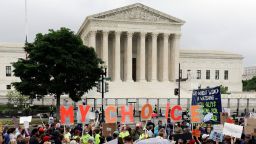The Supreme Court said Wednesday that a Border Patrol agent in Washington state cannot be personally sued in federal court for damages after a private citizen brought claims of illegal retaliation and excessive force.
The decision continues a recent trend of the high court cutting back on the ability of individuals to sue law enforcement officers who violate their constitutional rights when there is no specific law authorizing such a claim to go forward.
The ruling expands federal officers’ immunity from private lawsuits and reverses a lower court opinion that allowed the lawsuit to go forward. Lawyers for the Border Patrol agent argued that the threat of liability would interfere with his job duties.
The court said 9-0 that the Border Patrol agent could not face a lawsuit under a First Amendment claim of retaliation. The court also said that the agent could not face a lawsuit under the Fourth Amendment for an alleged excessive use of force, with the court’s three liberal justices dissenting.
CNN had filed a friend-of-the-court-brief arguing that the court should not further cut back the ability to bring damages lawsuits against government officials who violate the First Amendment.
The case was brought by Robert Boule, a US citizen who owned a bed and breakfast near the Canadian border in Washington. Boule had filed a lawsuit against Customs and Border Patrol Agent Erik Egbert, after a 2014 encounter at Boule’s inn during which Egbert allegedly used excessive force against Boule. Boule also alleged that Egbert engaged in retaliation against Boule after Boule reported injuries from the encounter to Egbert’s supervisors.
Boule sued Egbert in federal court, with a lawsuit seeking damages for a violation of his First and Fourth Amendment rights. Boule’s lawyers pointed to a 1971 decision called “Bivens” that held that a private individual could sue a federal officer for damages if his fundamental rights are violated. In recent years the court has been reticent to extend the holding of Bivens to other circumstances.
Writing for the majority, Justice Clarence Thomas said that lower courts had erred in finding Boule could pursue his Fourth Amendment claims under the “Bivens” test that the Supreme Court had previously laid out.
“Congress is better positioned to create remedies in the border-security context, and the Government already has provided alternative remedies that protect plaintiffs like Boule,” Thomas wrote.
The Supreme Court additionally concluded Wednesday that there was no Bivens cause of action for retaliation claims brought under the First Amendment.
Thomas wrote that extending Bivens to that context “could pose an acute risk of increasing” social costs, including “the risk that fear of personal monetary liability and harassing litigation will unduly inhibit officials in the discharge of their duties.”
“A plaintiff can turn practically any adverse action into grounds for a retaliation claim,” Thomas wrote, adding that even a “frivolous retaliation claim” could set off an expansive discovery process in “which there is often no clear end to the relevant evidence.”
“We are therefore ‘convinced’ that, in light of these costs, ‘Congress is in a better position to decide whether or not the public interest would be served’ by imposing a damages action,” Thomas wrote.
Justice Sonia Sotomayor, writing the dissent from the majority’s findings on the Fourth Amendment Bivens claims, said the majority had rewritten a legal standard it had recently put forward for those claims , with an opinion that “stretches national-security concerns beyond recognition, and discerns an alternative remedial structure where none exists.”
“Today’s decision does not overrule Bivens. It nevertheless contravenes precedent and will strip many more individuals who suffer injuries at the hands of other federal officers, and whose circumstances are materially indistinguishable from those in Bivens, of an important remedy,” Sotomayor wrote, joined by Justices Stephen Breyer and Elena Kagan.
Justice Neil Gorsuch wrote a concurring opinion that said that the court should “forthrightly return the power to create new causes of action to the people’s representatives in Congress.”
During the 2014 episode, Egbert stopped Boule in town to ask him about guests staying at the inn. Boule said that two of his employees were en route to pick up a guest who had recently arrived from Turkey. Later that day, when the guest arrived, Egbert followed the car carrying the guest into the driveway and attempted to approach it. Boule, asked Egbert to leave which led to an altercation. According to Boule, Egbert pushed him to the ground and began asking the guest about his immigration status. Boule called 911, more agents arrived for back up and determined the guest was lawfully in the country. After seeking treatment for back injuries, Boule complained to Egbert’s supervisors about his conduct at the inn and Egbert retaliated. Egbert contacted the IRS and asked it to look into Boule’s tax status.
In the lawsuit against Egbert, Boule argued Egbert had retaliated against him in violation of his First Amendment rights and that he had entered his private property, refused to leave and pushed him to the ground violating his Fourth Amendment rights.
“Awarding individual damages for federal officer misconduct has long-standing roots dating back to the founding and remains appropriate, albeit more limited, today,” Boule’s attorney, Felicia H. Ellsworth argued.
Sarah M. Harris, a lawyer for Egbert countered that the Constitution “vests Congress alone with the power to create damage actions” and that the judiciary “isn’t well suited to assess the systemic costs and benefits of a new damages action.”
“Border Patrol agents are in dangerous circumstances every day trying to interdict terrorists, smugglers, illegal entry and exit of foreign nationals crossing the border,” she said.
The Biden administration supported Egbert and argued that Bivens should not be extended to cover the case at hand.
This story has been updated with additional details.





